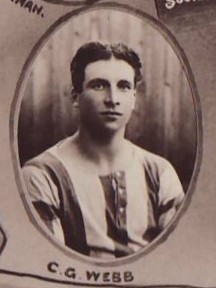Charlie Webb

Pictured in 1910
|
|||
| Personal information | |||
|---|---|---|---|
| Full name | Charles Graham Webb | ||
| Date of birth | 4 September 1886 | ||
| Place of birth | Curragh Camp, Ireland | ||
| Date of death | 13 June 1973 (aged 86) | ||
| Place of death | Hove, England | ||
| Height | 5 ft 8 in (1.73 m) | ||
| Playing position | Forward | ||
| Senior career* | |||
| Years | Team | Apps | (Gls) |
| 1902–1908 | Worthing | ||
| 1906–1908 | Essex Regiment | ||
| 1908–1909 | Bohemians | ||
| 1909–1915 | Brighton & Hove Albion | 248 | (73) |
| National team | |||
| 1909–1911 | Ireland | 3 | (0) |
| Teams managed | |||
| 1919–1947 | Brighton & Hove Albion | ||
| * Senior club appearances and goals counted for the domestic league only. |
|||
Charles Graham "Charlie" Webb (4 September 1886 – 13 June 1973) was an Irish association football player who represented his country once as an amateur and three times as a professional. He was employed by English club Brighton & Hove Albion for nearly forty years as player and manager.
Webb was born into a Scottish military family at the Curragh Camp, a military camp in County Kildare, Ireland, where his father, Sergeant William Webb of the Black Watch, was stationed. The family moved around following Sgt Webb's postings so the young Webb spent some of his childhood in Edinburgh Castle before settling in the Worthing, Sussex, area. As a 16-year-old, Webb played first-team played football for the town club, Worthing F.C., and in his second season, he contributed to Worthing winning a treble of the Sussex Senior Cup, the West Sussex Senior League, and a local charity cup.
In 1904, Webb followed in the family tradition by enlisting in the 2nd Battalion of the Essex Regiment. His trade in the Army was a clerk, and while serving in Ireland, he furthered his football career playing for his regimental team in the Leinster Senior League, and later, in the Irish Football League for Bohemians. He scored freely for his regiment – in November 1907 he scored all seven in a 7–4 defeat of Dublin University – and early the following year was the only player from outside the Irish League to be selected for the Leinster representative team to play Ulster. He had a trial with Scottish club Rangers in 1908, and later that year was chosen to represent the Irish League in a match against the English League. In November, he was capped by the Ireland amateur national team, in a match against the England amateurs in Dublin. Described by The Times' reporter as "distinctly the best of an indifferent forward line", he scored Ireland's late consolation goal in a 5–1 defeat.
...
Wikipedia
